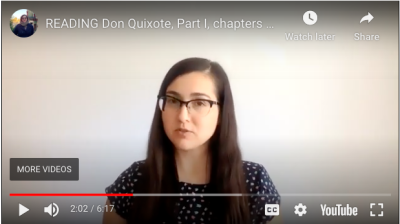Lucía Aja López is a Graduate Teaching Associate for the Department of Spanish and Portuguese. She transitioned SPAN 2320: Don Quixote in Translation to an online format for the Autumn 2020 semester. While this was the first time that she taught the English-language General Education (GE) course, she was no stranger to teaching in an online format. “I taught 1102 and 2202 online, and those experiences helped me a lot with building 2320. I’ve also had the opportunity to participate in workshops for online instruction offered by the Drake Institute for Teaching and Learning and the OSU Office of Distance Education and eLearning (ODEE), which have been great resources.”

Aja López feels that her experience as a graduate student within the Department of Spanish and Portuguese made it easier for her to transition the course on Don Quixote to an online format. “I use Carmen (the university’s on-line teaching platform) as both a student and an instructor. I’m aware of the pitfalls that can lead to confusion or disorganization within the platform, so I know how to avoid them.” She utilized resources offered by ODEE, such as their Carmen template for instructors and their many virtual workshops and trainings. “I think it’s important to take advantage of these types of opportunities, especially for instructors who are unfamiliar with building an online course.”
Despite her experience and resources, Aja López admits that the transition was still challenging at times. “Transitioning any course to an online format takes a great deal of time and energy. Figuring out what programs to use, and even seemingly small tasks such as writing out the directions for each assignment can be a lot to juggle.” Her strategy for transitioning the course follows ODEE’s suggestions. “I considered all of the elements that would be included in the face-to-face version of the SPAN 2320 course, then I considered how I could convert those elements to the online format.” Such changes included turning the four exams into four essays, uploading the lectures as video recordings to Carmen, utilizing the “Announcements” feature in Carmen every week, and creating activities via Discussion Boards in Carmen. In addition, the students interacted with their classmates throughout the semester via weekly small group Zoom meetings, where they discussed class material and responded to prompts from Aja López.
Even though the transition to an online format is an adjustment for instructors and students alike, Aja López was encouraged by the level of participation in 2320 this semester. “Because they had so much to submit in Carmen, I had more of a window into their thoughts on the course material. I really liked having more information about how they’re engaging with the subject matter.” The course also offered Aja López a different perspective on the ways that student learning is evaluated. “It served as a reminder that students learn and express themselves in different ways. Some people are better with expressing themselves in written form, and others are better at verbally conveying their thoughts and ideas. It’s important for instructors to keep that in mind as we build our courses, no matter the format.”
When asked what advice she would offer to instructors who are beginning the process of transitioning a course to an online modality, Aja López had two suggestions. “Firstly, I would recommend thinking about the interactions that happen in the physical classroom and consider how you could transition them to an online class. Secondly, I would remind instructors that less is more. Transitioning to an online course can feel like you’re starting back at zero. Recognize that it takes time to perfect a course, and in circumstances like these, sometimes the simpler the better – for both the instructors and the students!”
The Department of Spanish and Portuguese is thankful for the many hours of work that Lucía Aja López put into transitioning the SPAN 2320 course to an online format for the Autumn 2020 semester. Her dedication to her students and her willingness to educate herself on alternative teaching modalities has been a huge asset to the department, especially during this unprecedented year.
